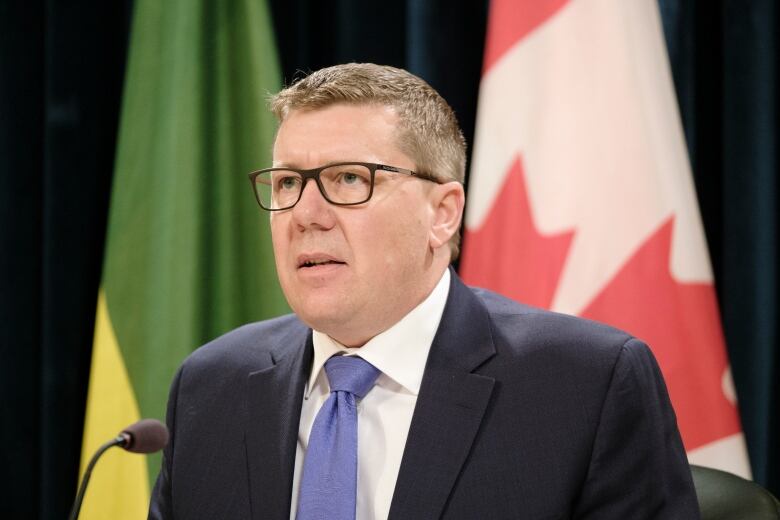A made-in-Saskatchewan carbon tax solution could look like New Brunswick's. Here's what that could mean
A rebate at the pump sounds good to consumers, but expert says it does nothing to reduce emissions
Despite a long-held opposition to instituting a price on carbon in Saskatchewan, Premier Scott Moe has capitulated after the province's legal challenge against the federal government was defeated on Thursday.
This week, the Supreme Court of Canada ruled 6-3against challenges from Alberta, Saskatchewan and Ontario. The court foundthat the federal government's carbon tax is constitutional.
All three provinces had refused to implement their own carbon prices and have had Ottawa impose its own regime, also known as the backstop,on themin an attempt to curbgreenhouse gas emissions.
It only took a few hours after the decision was released for Moe to announce that the province would implement a carbon pricing scheme.
"The government will submit a proposal that will see Saskatchewan design its own carbon-pricing system for fuel ... that will be similar to one the federal government has approved in the province of New Brunswick,"Moe told media.
The made-in Saskatchewan scheme could be in place as soon as next year, he said, although that would be contingent on the federal government signing off on the plan.
Premier Scott Moe's first response to the Supreme Court of Canada decision:
Todays decision by the Supreme Court of Canada does not change our core conviction that the federal carbon tax is bad environmental policy, bad economic policy, and simply wrong.
Read my full statement below: pic.twitter.com/owT29uYjag
—@PremierScottMoeWith Moe's announcement that the incoming carbon pricing plan could look similar to the New Brunswick's scheme, here is what that could mean.
Learning from New Brunswick
One of the key things to understand about New Brunswick's own plan to address greenhouse gas emissions is that it came about reluctantly.
The provincewas an intervener inearly challenges to the federal legislation, but changed its tone whenJustin Trudeau's Liberal party earned a minority government in the 2019 federal election.
Nicholas Rivers, the Canada research chair in climate and energy policy at the University of Ottawa, said the province submitted a plan that would "kind of nominally comply with the federal mandate,but also reduce the impact of the tax in some way."

Although Saskatchewanmay have taken a different path, it came to the same conclusion as New Brunswick: aprovince-made solution is preferred tothe imposition of a federal backstop.
"[The plan] would provide an immediate rebate right at the pump to Saskatchewan,"said Moe on Thursday.
Phrasing it as a rebate at the pump is similar to how New Brunswick environment minister Jeff Carr described hisprovince's decision when it adopted a pricing system.
I think was a mistake by the federal government to admit this as an approach that was compliant with the federal backstop at the time-Nicholas Rivers, the Canada Research Chair in Climate and Energy Policy at the University of Ottawa
In 2020, New Brunswick adopted a carbon pricing system that complied with the federal government's plan for a 6.6-cent-per-lite levy at the pumps.
The province also slashed its gas tax by more than four cents. It left New Brunswick consumers with a net cost of two cents.
The proposalwas accepted by the federal government at the time, althoughRivers believes Ottawa made a mistakein thedecision.
"I think it was a mistake by the federal government to admit this as an approach that was compliant with the federal backstop at the time," said Rivers.
"I was concerned at the time, not especially with the New Brunswick case, because they are avery small emitter, but more concerned that this would open the door to other provinces to do something similar. Here we have the door opened and I think that it's going to be tough to shut it."
Saskatchewan looks to be angling to get that same kind of deal, althoughit may be out of luck.
Federal environment minister JohnathanWilkinson,speaking onCBC's Power and PoliticsThursday, said that such a move "would defeat the whole purpose. It would defeat the price signal that exists which is to [incentivize] people to adopt more efficient behaviour."
He was even more forceful when asked why the federal government permitted New Brunswick to implement its scheme, but wouldn't be open to doing it in the future.
"That is something that we are looking to, to change and to fix on a go forward basis," Wilkinson said.
Saskatchewan's government did not immediately respond to a request to respond to Wilkinson's statement.
Ineffective against reducing emissions
Rivers saidthe idea of providing a rebate at the pumps negates the goal of the carbon pricing scheme.
"The idea of the carbon price is that by putting the price of carbon intensive fuels up, it will provide consumers with, you know, an incentive to reduce their use of those fuels and to reduce their emissions," he said.
Lessening the impact ofcarbon pricing means there is very little incentive to change behaviour.
"It's not like New Brunswick or Saskatchewan potentially is going to be making households better off by doing this," Rivers said.
"It is taking the money that they would ordinarily be getting in rebates, quarterly rebates and applying that that rebate money to reduce the price of gasoline."
Rivers was not the only one who criticized New Brunswick's approach.
Then-environment ministerDustin Duncan told media in 2019, soon after New Brunswick's plan was approved, that he wasn't sure how the plan met the federal standard.
"If that's the case, then what are we talking about? It really shows what this is all about. It is really not about reducing emissions," Duncan said.
With files from CBC's Adam Hunter and Jacques Poitras















_(720p).jpg)


 OFFICIAL HD MUSIC VIDEO.jpg)
.jpg)



























































































